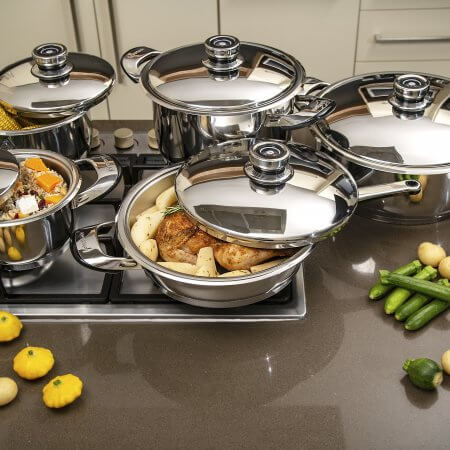- Perspective – December 2021
- Advert : Columbus Stainless
- Industry Insight
- Strategic Review
- Market Intelligence
- Women in Stainless Steel – SASSDA BOOSTS FEMALE PARTICIPATION IN THE STAINLESS STEEL ECONOMY“Women are the largest untapped reservoir of talent in the world” – Hillary Clinton The world is entering a new era of female empowerment. Where women are at the helm; they are the ‘captains of industry’, the moguls, industrialists and tycoons. In line with this, government has plans to roll out a National Strategic Plan, consisting of six pillars of which one, aims to ensure women’s economic and financial inclusion as part of a broader localisation drive. This will fuel a critically needed agenda that paves the way towards gender equality, poverty eradication, sustainability and inclusive economic growth. President Ramaphosa has said “We are going to drive women’s economic inclusion through public procurement. We have set the target of ensuring that 40% of goods and services procured by public entities are procured from women-owned business”. A Women’s Economic Assembly (WECONA) has therefore been created with the focus on finding “supply chain opportunities for women-owned businesses in key industries such as steel, automotive and energy sectors”, stated President Ramaphosa. COLLABORATING FOR SUSTAINABLE SOLUTIONS As a result, Sassda has been working with government to find opportunities for female-led companies within their membership and contribute…
- Advert : Unique Welding
- Sector Focus – LOCALISATION HAS POTENTIAL FOR FAR REACHING BENEFITSThe South African Stainless Steel Development Association (Sassda) is playing a vital role in developing downstream opportunities for the local holloware sector as part of its key stakeholder representation role in the development of the government’s Steel Master Plan. The plan has seen the dtic focusing on developing opportunities for stainless steel, and prioritising the localisation of products. This has been wrought with challenges in sourcing products from abroad, thereby increasing the need for localising the manufacturing of stainless steel products. Sassda Market Intelligence specialist Lesley Squires reports; “When the Steel Master Plan was first released last year, the stainless steel subsector received recognition for its work and the potential it offers the steel industry. Sassda’s role in the plan is aligned with its mandate, to promote the growth of the local conversion of stainless steel to the benefit of our members, industry, and the country. “Although there are a substantial number of stainless steel consumer goods available in the market, it was decided to put our focus into specific product types initially, with a view to sourcing from local manufacturers and ascertaining if the local pricing was acceptable to the clients.” She said…
- Case Study : 3CR12 in Busses
- Case Study : 3CR12 – 3CR12 OFFERS NEW SOLUTIONS TO AGE-OLD APPLICATIONSEarly humans made a breakthrough when the making and controlling of fire was invented. This was critical, not only for security and warmth but also provided new ways of preparing food. Since then, cooking has developed into a global industry and, as we all know, stainless steel plays an inherent part in this industry. However, the original cooking style developed by early men is still very popular in the shape of what we know as a braai. Especially in South Africa where nearly every household has an area for fire making and cooking on coals or flame. We also find that virtually all participants in the art of braaiing have a design for the ultimate braai and finding the best design often leads to ‘heated’ arguments! A METAL THAT KEEPS ITS COOL WHEN HOT In the US there is also a trend towards portable camping braais and 4×4 enthusiasts in Texas seems to be very impressed by the latest South African braai export. This homegrown innovation is manufactured by a local entrepreneur and is made from another South African innovation, 3CR12 stainless steel. The product is designed to last a lifetime with a 100-year…
- Personality Profile – A LIFETIME OF DEDICATIONThe greatest strength of the South African stainless steel sector is undoubtedly its people, who believe in the material’s ability to enhance and sustain the South African economy no matter how onerous the challenges it faces. For this reason, our profile series focuses on stainless professionals who embody the entrepreneurial spirit and who will shape our industry for years to come. In this issue, we speak to Wire Products Stainless Steel Director Tanya Papadopoulos. What was your path to forging a career in the South African stainless steel sector? I have no formal post school degree. I started in this industry at the age of 21 and it was not long after that, my interest in this industry grew. With the help of my predecessors, I was trained in different fields throughout my years at the company. I have been with the company for over 30 years and it is with my experience, initiative and dedication that I have succeeded in my current position. I look at this as an advantage where experience is what comes down to understanding the industry. What attracts me about this industry is that there are continuous opportunities for growth and I …
- Advertorial : SAIW – SAIW CHAMPIONS TOP QUALITY WELDING SKILLS ACROSS THE CONTINENTThe Southern African Institute of Welding (SAIW) is a champion of the world class skills, quality levels and productivity output that are all key rivers of a sustainable economic growth plan. In light of this, it aims to develop its existing top quality training and increase South Africa’s welding, NDT, inspection (including certified inspectors, IPEs and CPs) and welding coordinator (including the International Welding Practitioner, Specialist and Technologist) skills base. In line with this, the SAIW is forging a path to boost welding skills across the African continent and has signed an SLA with The African Welding Federation (TWF) of which it is a founding member. Significant to the TWF and SAIW alliance, is a strong focus on ISO 3834 certification, which allows certification bodies to assess a manufacturer’s ability to meet customer and regulatory quality requirements in fusion welding in both workshops and in the field, and further endorses a company’s welding employees as competent. It also boosts a manufacturer’s ability to sell its products in domestic and international markets. This type of strategic partnership is a key part of the SAIW’s long terms growth plans with Executive Director John Tarboton…
- Africa Market Intelligence – $60-BILLION MOZAMBIQUE OIL & GAS PROJECT BACK IN BUSINESSMozambique presents an excellent opportunity for the local supply of stainless steel into various ventures that form part of the $60-Billion oil and gas projects. Unfortunately, the project was halted in the first half of 2021 due to Islamist militant insurgencies in the far north of the country, in the provinces where the gas projects were located… Mozambique’s gas and oil fields have long been touted as a fertile breeding ground for new business opportunities in the form of project participation for South Africa stainless steel manufacturers, distributors, and fabricators. The good news is that despite the stalling of this project due to insurgency attacks, Italian energy services group Saipem SPMI.MI has now said it expects a major LNG project in Mozambique to restart around mid-2022 after it was put on hold this year for safety reasons. This follows French energy Group Total declaring a force majeure on its $20 billion liquefied natural gas project in Mozambique Late in April 2021 following insurgent attacks. A LOOK BACK & CURRENT CONTEXT… In the first half of the second millennium A.D., northern Mozambican port towns were frequented by traders from Somalia, Ethiopia, Egypt, Arabia,…
LOCALISATION HAS POTENTIAL FOR FAR REACHING BENEFITS

The South African Stainless Steel Development Association (Sassda) is playing a vital role in developing downstream opportunities for the local holloware sector as part of its key stakeholder representation role in the development of the government’s Steel Master Plan. The plan has seen the dtic focusing on developing opportunities for stainless steel, and prioritising the localisation of products. This has been wrought with challenges in sourcing products from abroad, thereby increasing the need for localising the manufacturing of stainless steel products.
Sassda Market Intelligence specialist Lesley Squires reports; “When the Steel Master Plan was first released last year, the stainless steel subsector received recognition for its work and the potential it offers the steel industry. Sassda’s role in the plan is aligned with its mandate, to promote the growth of the local conversion of stainless steel to the benefit of our members, industry, and the country. “Although there are a substantial number of stainless steel consumer goods available in the market, it was decided to put our focus into specific product types initially, with a view to sourcing from local manufacturers and ascertaining if the local pricing was acceptable to the clients.” She said some of the reasons for the retail sector looking at localisation are increased logistic costs, delays and closures of ports in the Far East, due to COVID-19, amongst others.”
WORK WITH MAJOR RETAILERS
 Delving deeper into its current work for stainless steel and holloware manufacturers and distributors Squires reports; “Earlier this year we were approached by the dtic, who requested our assistance in helping local retail organisations to localise the manufacturing of their stainless steel consumerware goods.
Delving deeper into its current work for stainless steel and holloware manufacturers and distributors Squires reports; “Earlier this year we were approached by the dtic, who requested our assistance in helping local retail organisations to localise the manufacturing of their stainless steel consumerware goods.
“The dtic facilitated contact with the Massmart Group and the project got underway. After Massmart, we were joined in this endeavour by Shoprite/Checkers, the Lewis Group and Elite Star Trading Africa - a grouping of smaller retail outlets in the Cape.” Squires elaborates; “Holloware includes fabricated products such as pots, pans, cutlery and other similar utensils. We are therefore working with four major retailers to meet their specifications and align them with our members so that they can fabricate these products locally. Since it takes a while to identify product specifications and design, these products will only be available in the second quarter of next year.”
CHAMPIONING STAINLESS STEEL IN THE STEEL MASTER PLAN

Looking ahead, labour and industry stakeholders are forging ahead with the establishment of the stainless steel section of the Steel Master Plan, while government is facilitating the process. Squires reports; “There are numerous opportunities for increasing local demand for stainless steel products by creating demand for locally produced hollowware through discussions with local retailers.” “The required capacity from local stainless steel fabricators to meet this demand for hollowware does exist and there is enough capacity. What we need to do, is to buy and support South African-produced products. To achieve this there should be an aggressive drive on a united front,” Squires concludes. Sassda was a key partner at this year’s Manufacturing Indaba where the message from Department of Trade, Industry and Competition (dtic) Minister Ebrahim Patel was very clear.
“We are on the cusp of great renewal in local manufacturing that can drive increased output and competitiveness, what we call re-industrialisation.” At this leading manufacturing event in Sub-Saharan Africa, the focus was on the incredible role in what the South African manufacturing sector can play in the development of the renewable energy sector including opportunities such as electric vehicles.
POSITIVE OUTCOMES
There have been many positive manufacturing projects and initiatives rolled out across the continent according to Minister Patel. They have been in the pharmaceutical sector with a variety of product lines, the Dube Trade Port in eThekwini has opportunities for fuel cell production and commitments by global auto manufacturers such as Ford Motor Company and Mercedes Benz. Minister Patel warned, however, that individual firms may inflate their prices as they prepare for localisation opportunities and asked businesses to invest in ways to improve the competitiveness and dynamism of local firms.
“The government has now introduced reciprocal commitments attached to tariff increases or rebates of duties, which include commitments by affected firms not to raise prices,” said Minister Patel.

